

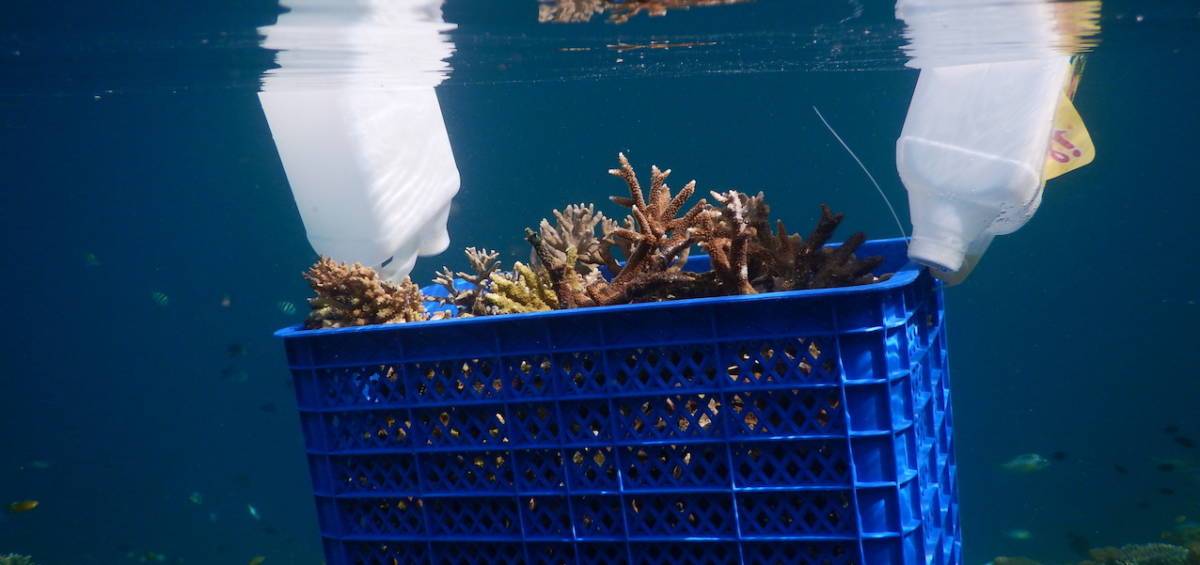
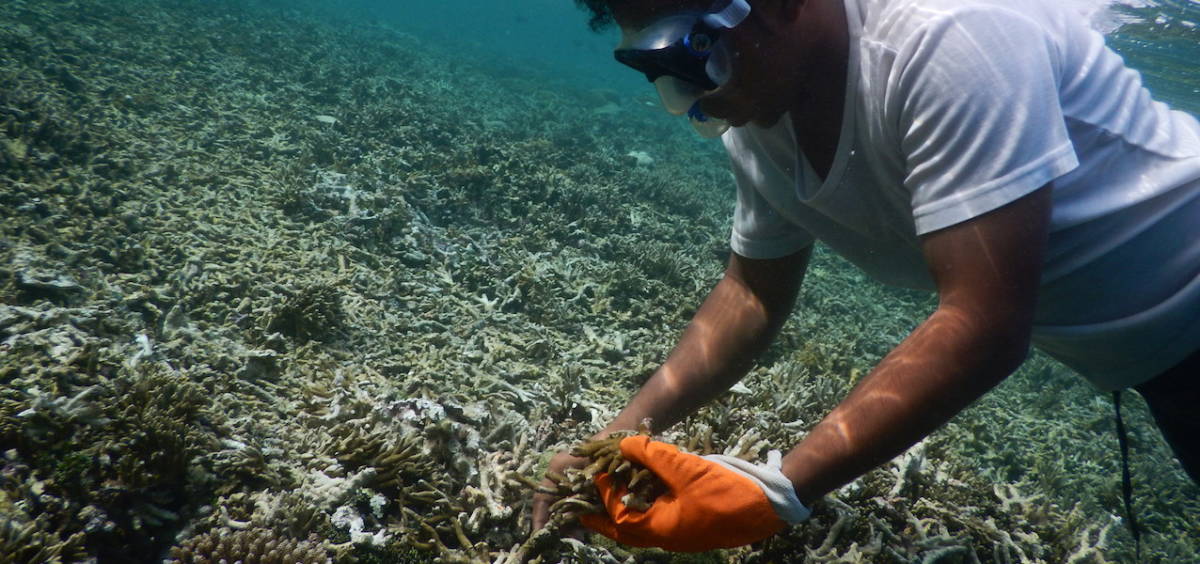
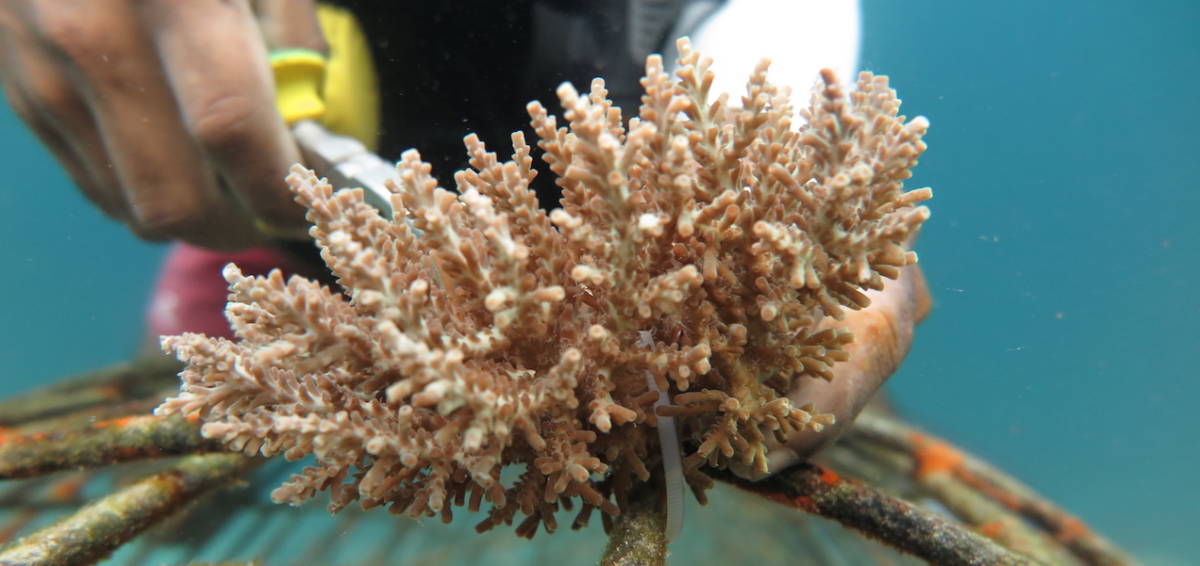
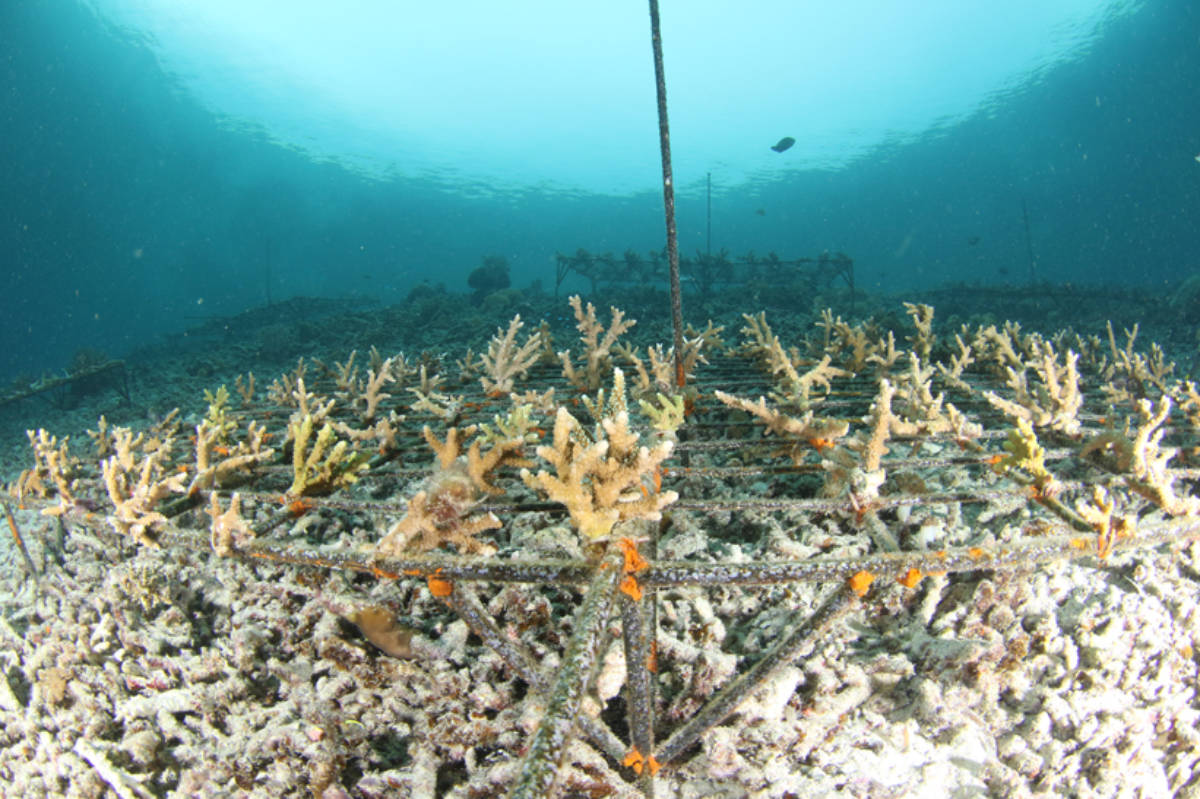
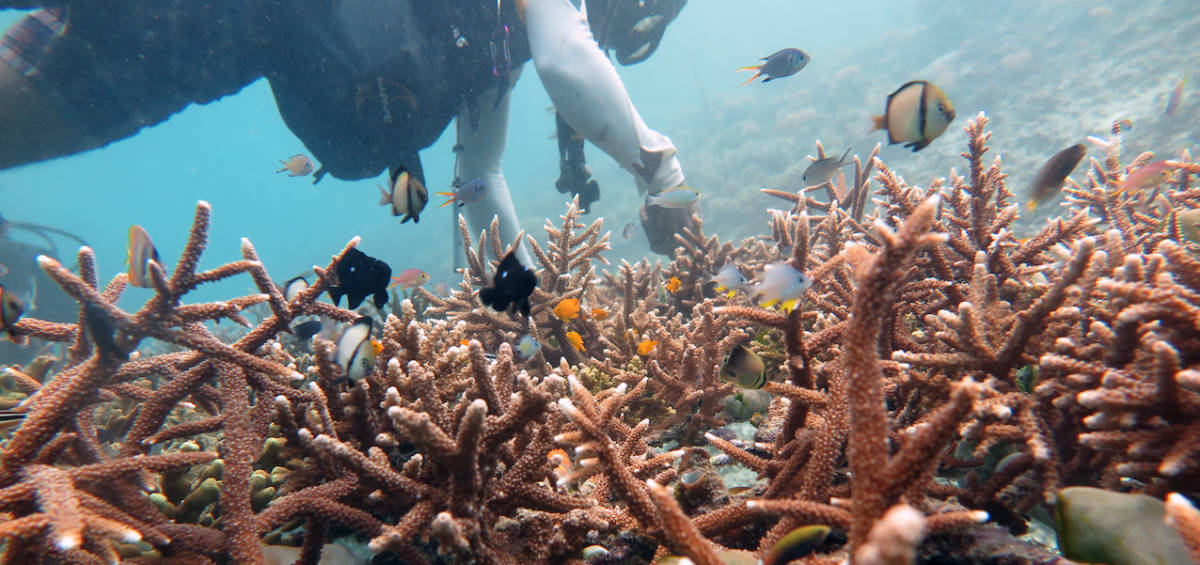
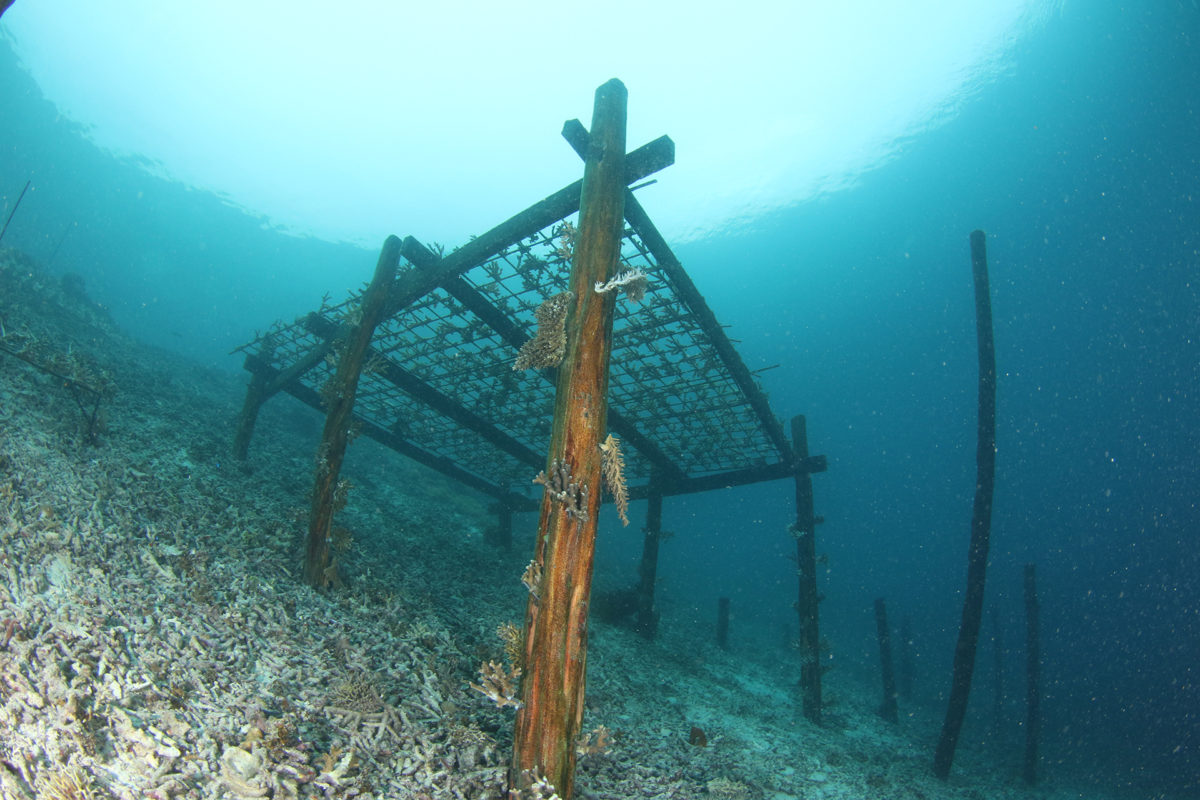
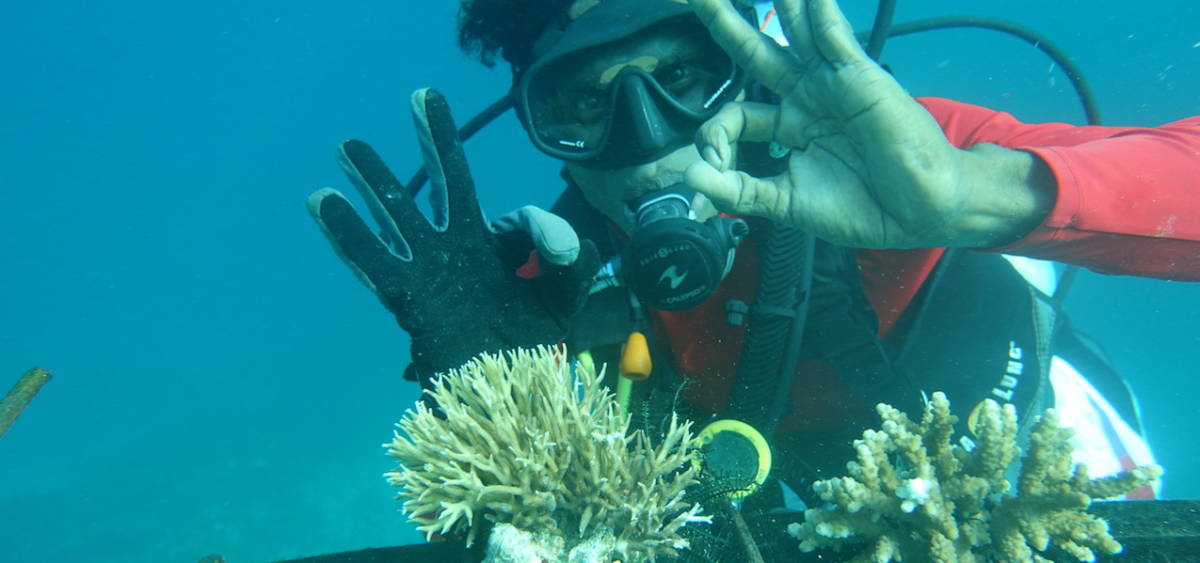
Yaf Keru Our Coral Garden
Raja Ampat is one of the last strongholds on Earth where coral reef systems still thrive. This archipelago shelters an incredible abundance of life, and forms what is currently thought to be the most biodiverse marine system on the planet. These stunning reefs provide a rich and sustainable food source to local communities in small villages throughout the archipelago. These reefs also support a healthy tourism economy providing livelihoods to significant portion of the community. Yet sadly, numerous reefs were destroyed by destructive fishing practices in the 80s & 90s, and to this day, they have not yet recovered. Additionally, the current rapid expansion of tourism in the region brings with it new impacts upon the marine environment. At a time where coral reef degradation is occurring worldwide due to human activity, and in response to human induced climate changes, it is essential and common sense to design and develop conservation tools to respond to these current and future degradation issues. Rather than waiting for the local reefs to become damaged or lose their natural resilience, our Yaf Keru project is aiming to evaluate and optimize the current (and remarkable) recovery potential of Raja Ampat’s reefs.
Objectives

To research and learn more about the resistance, resilience and regeneration potential of Raja Ampat’s healthy reefs
The Yaf Keru project provides an ideal natural laboratory that can be closely monitored to help us better understand coral’s response to changes in environmental conditions. It has been recently observed that coral reefs in Raja Ampat display a remarkable resilience and resistance to environmental stresses (ie: climate change, El Nino). During a period of time when coral reefs the world over are degrading more rapidly than any other period in history, it is extremely important to understand the regeneration potential of corals within Raja Ampat’s ideal conditions. We hope over the next 3 years to learn more about coral growth, natural recruitment as well as their ability to resist, adapt and cope with current climate change dynamics.

Contribute to the restoration, maintenance and conservation of the Dampier Strait reef systems and the services they provide
Nearly 10 years after the designation of Marine Protected areas within the region, the scars of dynamite and cyanide fishing still remain, and are observable on local reefs. With rapidly increasing tourism to the area, and the influence of climate change, coral conservation and management tools are needed now more than ever. Throughout this project, we hope to create a team of local “coral gardeners” capable of mitigating past, present and future degradation of local coral reefs.

Directly improve the livelihood of local community members by creating paid working positions
This project aims at providing alternative livelihoods to the local community in an attempt to reduce existing environmental pressures and replacing it instead with practices enhancing local ecosystems services.
Our coral gardeners (Tomy, Yermi & Rio) are local community members from surrounding villages. Growing up in Raja Ampat, all rely upon fishing as the main source of sustenance for themselves and their family. As per many locals in the region, during the era when dynamite fishing was prominent (during the late 90s and early 2000s) during their youth they witnessed and at times participated in this destructive fishing practice.
Our Coral Gardeners are now the core team responsible for restoring Yaf Keru, and eventually larger degraded areas in the region.

To raise awareness and educate both the local and international communities about coral reef ecology; and the functions and services they provide
Education is a fundamental component in our quest to contribute to the conservation of the Dampier Strait marine environment. Our Coral Gardeners will eventually become ambassadors for coral reef conservation, capable of raising environmental awareness within their communities, as well as the international community through guests visiting the resort. Yaf Keru also serves as an educational platform and will be used to give a hands on experience of coral ecology to both the local youth and the resorts guests.

To research and learn more about the resistance, resilience and regeneration potential of Raja Ampat’s healthy reefs
The Yaf Keru project provides an ideal natural laboratory that can be closely monitored to help us better understand coral’s response to changes in environmental conditions. It has been recently observed that coral reefs in Raja Ampat display a remarkable resilience and resistance to environmental stresses (ie: climate change, El Nino). During a period of time when coral reefs the world over are degrading more rapidly than any other period in history, it is extremely important to understand the regeneration potential of corals within Raja Ampat’s ideal conditions. We hope over the next 3 years to learn more about coral growth, natural recruitment as well as their ability to resist, adapt and cope with current climate change dynamics.

Contribute to the restoration, maintenance and conservation of the Dampier Strait reef systems and the services they provide
Nearly 10 years after the designation of Marine Protected areas within the region, the scars of dynamite and cyanide fishing still remain, and are observable on local reefs. With rapidly increasing tourism to the area, and the influence of climate change, coral conservation and management tools are needed now more than ever. Throughout this project, we hope to create a team of local “coral gardeners” capable of mitigating past, present and future degradation of local coral reefs.

Directly improve the livelihood of local community members by creating paid working positions
This project aims at providing alternative livelihoods to the local community in an attempt to reduce existing environmental pressures and replacing it instead with practices enhancing local ecosystems services.
Our coral gardeners (Tomy, Yermi & Rio) are local community members from surrounding villages. Growing up in Raja Ampat, all rely upon fishing as the main source of sustenance for themselves and their family. As per many locals in the region, during the era when dynamite fishing was prominent (during the late 90s and early 2000s) during their youth they witnessed and at times participated in this destructive fishing practice.
Our Coral Gardeners are now the core team responsible for restoring Yaf Keru, and eventually larger degraded areas in the region.

To raise awareness and educate both the local and international communities about coral reef ecology; and the functions and services they provide
Education is a fundamental component in our quest to contribute to the conservation of the Dampier Strait marine environment. Our Coral Gardeners will eventually become ambassadors for coral reef conservation, capable of raising environmental awareness within their communities, as well as the international community through guests visiting the resort. Yaf Keru also serves as an educational platform and will be used to give a hands on experience of coral ecology to both the local youth and the resorts guests.

To research and learn more about the resistance, resilience and regeneration potential of Raja Ampat’s healthy reefs
The Yaf Keru project provides an ideal natural laboratory that can be closely monitored to help us better understand coral’s response to changes in environmental conditions. It has been recently observed that coral reefs in Raja Ampat display a remarkable resilience and resistance to environmental stresses (ie: climate change, El Nino). During a period of time when coral reefs the world over are degrading more rapidly than any other period in history, it is extremely important to understand the regeneration potential of corals within Raja Ampat’s ideal conditions. We hope over the next 3 years to learn more about coral growth, natural recruitment as well as their ability to resist, adapt and cope with current climate change dynamics.
Targets 2018 – 2019

Create full time livelihoods – more Coral Gardeners!
Through the expansion of our reef restoration, we are aiming to train and employ additional Coral Gardeners to become the custodians of their own Yaf Keru. As were the original Coral Gardeners, they will be trained in coral ecology, structure building, collection and transplant techniques, as well as communication and empowerment that will enable them to assist in managing tourist behaviour around coral reefs.

To replicate the project in nearby villages
After the completion of a successful 2 year pilot study, including training of local coral gardeners, we have now finalised our restoration techniques and are ready to expand this project to nearby villages. With grant funding from Kehati and the Blue Abadi Fund, and collaboration with local communities, we are looking to restore house reefs near jetties that are currently under pressure from increased tourism activities (trampling, boat and anchor damage).

Promote environmental awareness among tourists around the projects
As per the original Yaf Keru, the new restoration projects will serve as education platforms for local community members, and visiting tourists. Jetties will include signage and displays outlining basic coral ecology and its importance, and regulations for behaviour whilst in the water or on the jetties at local villages. Jetty officers (see next Objective) will be responsible for the enforcement of these regulations.

Create full time livelihoods – Jetty Officers
This project will also include the selection and training x2 jetty officers whose job it will be to implement some simple tourist management techniques; including checking marine park tags, and enforcing the basic rules outlined in signage (ie: don’t step on coral, don’t feed fish, don’t leave rubbish, etc)

Create full time livelihoods – more Coral Gardeners!
Through the expansion of our reef restoration, we are aiming to train and employ additional Coral Gardeners to become the custodians of their own Yaf Keru. As were the original Coral Gardeners, they will be trained in coral ecology, structure building, collection and transplant techniques, as well as communication and empowerment that will enable them to assist in managing tourist behaviour around coral reefs.

To replicate the project in nearby villages
After the completion of a successful 2 year pilot study, including training of local coral gardeners, we have now finalised our restoration techniques and are ready to expand this project to nearby villages. With grant funding from Kehati and the Blue Abadi Fund, and collaboration with local communities, we are looking to restore house reefs near jetties that are currently under pressure from increased tourism activities (trampling, boat and anchor damage).

Promote environmental awareness among tourists around the projects
As per the original Yaf Keru, the new restoration projects will serve as education platforms for local community members, and visiting tourists. Jetties will include signage and displays outlining basic coral ecology and its importance, and regulations for behaviour whilst in the water or on the jetties at local villages. Jetty officers (see next Objective) will be responsible for the enforcement of these regulations.

Create full time livelihoods – Jetty Officers
This project will also include the selection and training x2 jetty officers whose job it will be to implement some simple tourist management techniques; including checking marine park tags, and enforcing the basic rules outlined in signage (ie: don’t step on coral, don’t feed fish, don’t leave rubbish, etc)

Create full time livelihoods – more Coral Gardeners!
Through the expansion of our reef restoration, we are aiming to train and employ additional Coral Gardeners to become the custodians of their own Yaf Keru. As were the original Coral Gardeners, they will be trained in coral ecology, structure building, collection and transplant techniques, as well as communication and empowerment that will enable them to assist in managing tourist behaviour around coral reefs.
Project Status – 2018

Promote environmental awareness among tourists around the projects
First project replication set to start in spring 2018 – with completion expected in summer 2018.. with installation of Yaf Keru already underway in the village of Sawandarek, and other villages to follow (see objectives above). And because we like to think big… already have our sights set on a large expanse of degraded reef (seriously large) with hopes to initiate a large scale project in 2019.

Yaf Keru – Papua Explorers
We are pleased to announce that Yaf Keru – Papua Explorers is now considered complete! And now, like any established garden, we can sit back and enjoy watching it grow. Total corals transplanted: more than 6000 fragments Area restored: 500 sqm restored with about 900 sqm of healthy reef protected below To say it is thriving is an understatement – through trial and error we established appropriate techniques for appropriate environments (slope, reef flat, variable depths, coverage) an are as always, stunned at the regeneration ability of corals when given a CHANCE. As it turns out… coral will not only survive, but THRIVE when given clean water, a passable temperature and the right amount of nutrients.

Promote environmental awareness among tourists around the projects
First project replication set to start in spring 2018 – with completion expected in summer 2018.. with installation of Yaf Keru already underway in the village of Sawandarek, and other villages to follow (see objectives above). And because we like to think big… already have our sights set on a large expanse of degraded reef (seriously large) with hopes to initiate a large scale project in 2019.

Yaf Keru – Papua Explorers
We are pleased to announce that Yaf Keru – Papua Explorers is now considered complete! And now, like any established garden, we can sit back and enjoy watching it grow. Total corals transplanted: more than 6000 fragments Area restored: 500 sqm restored with about 900 sqm of healthy reef protected below To say it is thriving is an understatement – through trial and error we established appropriate techniques for appropriate environments (slope, reef flat, variable depths, coverage) an are as always, stunned at the regeneration ability of corals when given a CHANCE. As it turns out… coral will not only survive, but THRIVE when given clean water, a passable temperature and the right amount of nutrients.

Promote environmental awareness among tourists around the projects
First project replication set to start in spring 2018 – with completion expected in summer 2018.. with installation of Yaf Keru already underway in the village of Sawandarek, and other villages to follow (see objectives above). And because we like to think big… already have our sights set on a large expanse of degraded reef (seriously large) with hopes to initiate a large scale project in 2019.
Project Status – September 2016 to September 2017

Coral Explorers 2017
In July this year we conducted our first annual Coral Explorers trip. 8 guests, 2 divemasters, 3 coral gardeners and a number resort staff were lead through a series of workshops, presentations and dives lead by world leading coral scientists: Russell Kelly and Dr Rachel Pears. From life cycles, to tentacles, to how to ID.. we can safely to say the understanding and appreciation of Coral reefs and their significance increased immensely after this trip! Amongst a myriad of other amazing coral facts, we found at local dive sites:
– 57 out of 82 known hard corals were found on the house reef
– Coral formations unseen before by both Russell & Dr Pears (who have seen have seen a lot of coral in their time!)
– A very special find: “Pseudoclodochonus” , a rare coral of which the only known species (P. hicksoni Vesrslys) was spotted in 1907!

Coral Gardener Training
Prior to the launch of our Yaf Keru project, our coral gardeners travelled to Labuan Bajo, to join a one month training program with Coral Guardian – a non-profit organization dedicated to coral reef conservation. Throughout the training period, Tommi, Yermi & Rio acquired skills including coral ecology and transplantation skills, and how to raise awareness and collect data amongst local fishing communities. They now work together to build the structures, transplant corals and monitor the project.

Ongoing monitoring
In May-June 2016, a baseline survey was conducted prior to the start of the restoration work . The number and diversity of fish and corals were measured to assess reef health in and and around the pilot study area.
Since then, a rigorous monitoring program has been conducted by our resident project coordinator and Marine Biologist Arno. The reef health dynamics will be monitored over at least 12 months and will allow to scientifically evaluate the effectiveness of the Yaf Keru project.

Preliminary results
Upon transplantation, the corals quickly settled and began growing around their ties and to the structures. Within the first month, Acropora corals grew 1cm with very little mortality. Since then all coral species are demonstrating healthy growth each month and we expect that within 3-5 years the coral tables will be completely covered with healthy coral.

Coral Gardener – Yermi – planting corals on one of the first structures. Scroll right for images after first 5 months.

Structures during first week

5 months after plantation
After just 5 months corals were thriving; with less than 15% mortality corals were growing and very quickly becoming inhabited by molluscs, grazing fish and even larger predatory fish!

5 months after plantation

5 months after plantation

First 12 months
It is now 12 months since we installed our first structure, and the restored area is remarkably different to is pre-restoration state. The area has been transformed from a desolate rubble covered area with life limited, to an ecosystem containing everything from macro life, to grazers to large predatory fish. Additionally, Yaf Keru it is not only restoring the reef, but proving to be an extremely valuable education and research tool for everyone that comes into contact with it: from staff, resort guests, village children to scientists.
THE NUMBERS:
AREA RESTORED: 500m2
NUMBER OF STRUCTURES: 32
NUMBER OF CORALS TRANSPLANTED: 5000+

Survival Rates – First 12 Months
Currently no change – the transplanted fragments are still going strong. There is no new mortality on the experimental tables, with a consistent survival rate of 88%. Newer structures demonstrate an initial 10% mortality over the first 3 three months, generally due to predation from Drupella snails. One instance of predation was attributed to a Crown of Thorns starfish, however, COTs in this area are not considered a problem as they exist in a balanced ecosystem where there are enough predators (groupers, triton trumpet snails) to keep them at bay.

Growth Rates – First 12 months
Following the initial “natural selection” during the settling phase, the remaining corals keep growing at remarkable rates. Fastest growing are the acropora species, demonstrating growth of approximately 1.5cm per month. Slower growing species show a growth rate of 1mm per month – highlighting just how old the large and established reef systems in Raja Ampat are!

What’s Next? Beyond the first 12 months…
We are now in the final phase of our pilot study and are currently proofing a new method of substrate stabilization… chicken wire! This method is more cost effective and, combined with the traditional structures, will help in maximizing the restoration “cost/surface” ratios once we start working on large projects.
We are also currently in the process of securing funding for a NEW Yaf Keru project located on popular tourist island, Sawandarek. This stunning house reef has suffered due to increasingly high numbers of tourism traffic, with areas of coral nearby and under the jetty now damaged/broken. Still a stunning dive and snorkel site, we are aiming to establish a new coral garden dedicated to raising awareness about good tourism practices around coral reefs. This project will be supported by, and in collaboration with villagers and local government, and ideally commence in May 2018.

Coral Explorers 2017
In July this year we conducted our first annual Coral Explorers trip. 8 guests, 2 divemasters, 3 coral gardeners and a number resort staff were lead through a series of workshops, presentations and dives lead by world leading coral scientists: Russell Kelly and Dr Rachel Pears. From life cycles, to tentacles, to how to ID.. we can safely to say the understanding and appreciation of Coral reefs and their significance increased immensely after this trip! Amongst a myriad of other amazing coral facts, we found at local dive sites:
– 57 out of 82 known hard corals were found on the house reef
– Coral formations unseen before by both Russell & Dr Pears (who have seen have seen a lot of coral in their time!)
– A very special find: “Pseudoclodochonus” , a rare coral of which the only known species (P. hicksoni Vesrslys) was spotted in 1907!

Coral Gardener Training
Prior to the launch of our Yaf Keru project, our coral gardeners travelled to Labuan Bajo, to join a one month training program with Coral Guardian – a non-profit organization dedicated to coral reef conservation. Throughout the training period, Tommi, Yermi & Rio acquired skills including coral ecology and transplantation skills, and how to raise awareness and collect data amongst local fishing communities. They now work together to build the structures, transplant corals and monitor the project.

Ongoing monitoring
In May-June 2016, a baseline survey was conducted prior to the start of the restoration work . The number and diversity of fish and corals were measured to assess reef health in and and around the pilot study area.
Since then, a rigorous monitoring program has been conducted by our resident project coordinator and Marine Biologist Arno. The reef health dynamics will be monitored over at least 12 months and will allow to scientifically evaluate the effectiveness of the Yaf Keru project.

Preliminary results
Upon transplantation, the corals quickly settled and began growing around their ties and to the structures. Within the first month, Acropora corals grew 1cm with very little mortality. Since then all coral species are demonstrating healthy growth each month and we expect that within 3-5 years the coral tables will be completely covered with healthy coral.

Coral Gardener – Yermi – planting corals on one of the first structures. Scroll right for images after first 5 months.

Structures during first week

5 months after plantation
After just 5 months corals were thriving; with less than 15% mortality corals were growing and very quickly becoming inhabited by molluscs, grazing fish and even larger predatory fish!

5 months after plantation

5 months after plantation

First 12 months
It is now 12 months since we installed our first structure, and the restored area is remarkably different to is pre-restoration state. The area has been transformed from a desolate rubble covered area with life limited, to an ecosystem containing everything from macro life, to grazers to large predatory fish. Additionally, Yaf Keru it is not only restoring the reef, but proving to be an extremely valuable education and research tool for everyone that comes into contact with it: from staff, resort guests, village children to scientists.
THE NUMBERS:
AREA RESTORED: 500m2
NUMBER OF STRUCTURES: 32
NUMBER OF CORALS TRANSPLANTED: 5000+

Survival Rates – First 12 Months
Currently no change – the transplanted fragments are still going strong. There is no new mortality on the experimental tables, with a consistent survival rate of 88%. Newer structures demonstrate an initial 10% mortality over the first 3 three months, generally due to predation from Drupella snails. One instance of predation was attributed to a Crown of Thorns starfish, however, COTs in this area are not considered a problem as they exist in a balanced ecosystem where there are enough predators (groupers, triton trumpet snails) to keep them at bay.

Growth Rates – First 12 months
Following the initial “natural selection” during the settling phase, the remaining corals keep growing at remarkable rates. Fastest growing are the acropora species, demonstrating growth of approximately 1.5cm per month. Slower growing species show a growth rate of 1mm per month – highlighting just how old the large and established reef systems in Raja Ampat are!

What’s Next? Beyond the first 12 months…
We are now in the final phase of our pilot study and are currently proofing a new method of substrate stabilization… chicken wire! This method is more cost effective and, combined with the traditional structures, will help in maximizing the restoration “cost/surface” ratios once we start working on large projects.
We are also currently in the process of securing funding for a NEW Yaf Keru project located on popular tourist island, Sawandarek. This stunning house reef has suffered due to increasingly high numbers of tourism traffic, with areas of coral nearby and under the jetty now damaged/broken. Still a stunning dive and snorkel site, we are aiming to establish a new coral garden dedicated to raising awareness about good tourism practices around coral reefs. This project will be supported by, and in collaboration with villagers and local government, and ideally commence in May 2018.

Coral Explorers 2017
In July this year we conducted our first annual Coral Explorers trip. 8 guests, 2 divemasters, 3 coral gardeners and a number resort staff were lead through a series of workshops, presentations and dives lead by world leading coral scientists: Russell Kelly and Dr Rachel Pears. From life cycles, to tentacles, to how to ID.. we can safely to say the understanding and appreciation of Coral reefs and their significance increased immensely after this trip! Amongst a myriad of other amazing coral facts, we found at local dive sites:
– 57 out of 82 known hard corals were found on the house reef
– Coral formations unseen before by both Russell & Dr Pears (who have seen have seen a lot of coral in their time!)
– A very special find: “Pseudoclodochonus” , a rare coral of which the only known species (P. hicksoni Vesrslys) was spotted in 1907!
Further Context
The extent of the damage caused by bomb and cyanide fishing in the Dampier Strait is hard to evaluate due to the absence of previous baseline study. Yet, several kilometres deserted rubble slopes, levelled by destructive fishing practices, can be found within some the Dampier Strait reef systems. It is difficult to determine whether these areas were previously pristine and have degraded due to natural or anthropogenic causes, however, the lack of natural regeneration over the last decade suggests a need for artificial restoration. 20m east of our Dive Centre a stretch of degraded reef can be found that covers an area of approximately 1000 m2 There, the coral rubble layer can reach up to 1.5m in thickness, and regularly slides down the slope and onto the healthy reefs below. This rubble is an unstable substrate, meaning coral polyps cannot attach, grow and establish themselves as new and healthy coral reefs. Instead, new recruits only grow to a small size then die, producing more rubble in the process. This is a continual cycle of degradation leading to a situation where the reef cannot repair itself. Yaf Karu, which means “Coral Garden” in the local language, will see the installation of a number of artificial reef structures. These structures will have coral fragments transplanted upon them, and will provide a stable substrate for the fragments to establish themselves, and thrive, ultimately restoring the damaged area. Within 3-5 years we anticipate that the structures will be covered completely with various species of coral, attracting aggregations of fish, invertebrates and macro life that can be seen on thriving reefs elsewhere in Raja Ampat. The restoration of the house reef will serve as a pilot project and if proven successful, we aim to replicate our restoration techniques in front of local villages and other damaged areas.
